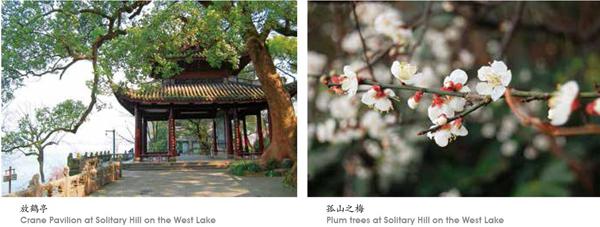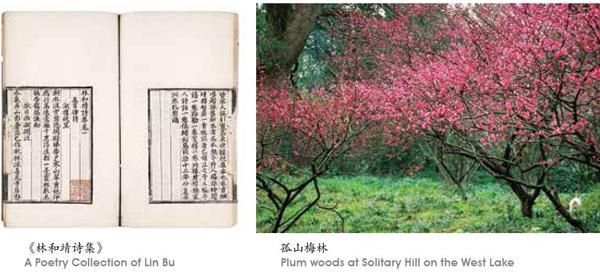林和靖:隐入湖光山色间
2018-04-04青湖
青湖
橫斜浮动
宋林逋《山园小梅》写杭州孤山梅花“疏影横斜水清浅,暗香浮动月黄昏”,别具一格,韵味无穷,使西湖之梅天下著名。其实,林逋这两句诗借用了五代南唐江为既写竹又写桂花的残句:“竹影横斜水清浅,桂香浮动月黄昏”,将“竹”改成“疏”,将“桂”改成“暗”而已,但这“点睛”之笔,使梅花形神活现,成为千古佳句。

林逋(967—1028),字君复,又称和靖先生,杭州钱塘人。据《宋史》本传等文献记载,他早年也曾北上江淮壮游,行也不远,没有成果,归来后便居住西湖孤山,足迹不到城市20年。他优游湖山,吟诗为乐,多奇句,有300余篇传世,存集四卷。
西湖“秀美闲雅、浑然天成”,实为“宇宙赋形之尤物”(近代邵裴子《林和靖先生诗集·序》)。林逋久居西湖,山色水光已成为他生命与精神的重要组成部分,比如“笛声风暖野梅香,湖上凭阑日渐长。一样楼台围佛寺,十分烟雨簇渔乡”(《酬昼师西湖春望》),又比如“片山兼水绕,晴雪复漫漫。一径何人到,中林尽日看”(《孤山雪中写望》)。
宋陈均《九朝编年备要》卷八云:林逋“恬淡好古、不趋荣利”,道出了诗人的性格和情怀。“竹树绕吾庐,清深趣有余。鹤闲临水久,蜂懒采花疏。酒病妨开卷,春阴入荷锄。尝怜古图画,多半写樵渔”(《小隐自题》),“鹤闲”“蜂懒”就是诗人自己率性而为的隐居生活的写照。
林逋作为诗人,在中国古典文学中影响最大的是咏梅诗篇,他以梅花为咏唱主调的诗作总共有八首,在宋代即被称为“孤山八梅”,欧阳修在《归田录》中说:“‘疏影横斜水清浅,暗香浮动月黄昏,评诗者谓前世咏梅者多矣,未有此句也。”
隐入湖山
隐逸是一种特殊的文化现象,以老庄的道家思想为哲学基础,表现是多方面的,最直接的表现就是遁迹山林,寻求自我修养,并在自我构筑的理想世界中寄托情操。它普遍地生成于魏晋,成为风尚,是中国古代文人保持人格独立的处世哲学,对这一时期乃至以后的世俗文化有深远的影响。
相传,林逋栽种了300多株梅树,用梅子换米度日,姑妄听之。林逋又养鹤为伴,沈括在内容丰富的《梦溪笔谈》里记载:“林逋隐居杭州孤山,常畜两鹤,纵之,则飞入云霄,盘旋久之,复入笼中。逋常泛小艇游西湖诸寺,有客至逋所居,则一童子出应门,延客坐,为开笼纵鹤。”林逋给自己的鹤取名“鸣皋”,取意清冷孤高。
后人称林逋“梅妻鹤子”。在中国传统文化中,鹤的形象优雅飘逸,梅经霜傲雪,都象征着君子孤高傲岸、隐逸超然的性格,以及追求超凡脱俗的人生境界。
林逋终身布衣、不追求仕进而为后世所重,皆因过去的士人大都面临着一种境遇:一入仕途就得遵守政治的、思想的、伦理的、文化的诸多规则,或受世俗的干扰,从而丧失身心自由,于是,通常在仕进不达的境况下选择归隐。世间不如意者多,入世与出世的困惑,总以后者为标榜。
林逋40多岁时名气已经很大,范仲淹称之为“山中宰相”。很多人问林逋为何过得这样清苦,他说:“然吾志之所适,非功名富贵也,只觉得青山绿水与我情相宜。”他的这种生活方式,就是传统士人在林泉间寻求个性存在的东方哲学式的解决方法。因此,苏轼也赞扬过林逋的诗、书。
宋真宗赵恒曾下诏杭州官府逢年过节慰问林逋并送粮米钱帛。林逋却说:“湖上青山对结庐,坟前秋色亦萧疏。茂陵他日求遗稿,犹喜曾无封禅书。”林逋死后,谥和靖先生,有哀荣。
孤山不孤
林逋隐居山林,但访客不断,而且相晤者大都为达官贵人,这表明他并不是完全与世隔绝,隐逸不够彻底,内心处在出世、入世的两难纠结之间。这种纠结,一方面与中国传统知识分子根深蒂固的功名思想有关,另一方面也和他的隐居地有关。西湖山水不是隔绝出尘之区,杭州紧邻西湖立城,西湖的风景和城市的烟火是相互融合的。杭州的世俗风情的成熟在北宋,南宋之后,西湖的山山水水、一草一木既有历史沉淀下来的人文内涵,也有市井生活的热闹和烟火气息。林语堂在他的《京华烟云》这部小说中就曾借主人公之口说出,杭州是盛装出场的华丽少女,苏州是溪边浣纱的婉约少妇。
明末散文家张岱在《西湖梦寻》中说,南宋灭亡后,有贼盗林逋之墓,只找到一方端砚和一支玉簪。端砚自可视为诗人物件,玉簪难免引人遐思,这让人忆起林逋的小情诗《长相思》:“吴山青,越山青,两岸青山相对迎,争忍离别情。君泪盈,妾泪盈,罗带同心未结成,江头潮难平。”
读过这首诗的人不禁会想,那个终身只爱草木禽羽的隐士,能写出如此柔情百转的诗吗?张岱的笔实在是弯曲。
纵然如此,林逋隐逸西湖在整个中国文化史上都有着不同寻常的意义。他一方面避居山林,获得心灵的自由;另一方面又极注重个人修为,“穷则独善其身”,过着简单、淳朴的生活,以自己独特的方式结合了儒家的道德完善与道家清静无为两大传统,纾解了魏晋以来困扰士人的“自然”与“名利”之争。就是这样一位超尘脱俗的才子,把自己的才华、情感融进自然,创造了属于北宋与杭州的皈依山水的隐逸文化。
所以,林逋之于西湖文化史乃至中国文化史,都是有代表性的人物。林逋无论在中国文化史还是中国文学史上都有一席之地。西湖衍生的文化思想、文学作品以及西湖的文化名人之间是相互造就的。林逋的意义也在于此。
(本文照片由小五拍摄)
If it had not been for Lin Bu (967–1028), a hermit living in Hangzhou in the Northern Song (960-1127) of China, one important aspect of the beauty of the West Lake in Hangzhou would have had to wait for another few hundred years to be discovered. In his , he described the plum blossoms at the Solitary Hill in Hangzhou by ‘borrowing and improving two lines of a poem penned by someone in the Five Dynasties (907-960). It reads “Sparse shadows slant across the clear water shallow; subtle fragrance floats serenely in moonlight mellow”. The ‘plagiary turned out to be quite a success. The borrowed lines, in which only two words were changed to fit the new scenario, most aptly portray the intoxicating scenery. The nondescript artistry of the poem won the recognition from the great Song scholar Ouyang Xiu (1007-1072), who mentioned the verse as “unprecedented”.

A native of Qiantang (todays Hangzhou) and one of the most famous poets of his time, Lin lived in recluse by the West Lake outside the walled Hangzhou for much of his later life, after wasting many of his younger years traveling to the north and trying in vain to realize his lofty aspirations.
His works and self-imposed solitude won him nationwide fame, and he was offered prestigious government posts, although he stayed away from all civic duties in pursuit of his poetry and a reclusive lifestyle. In his early 40s, Lin Bu was reaching the peak of his fame, called jokingly by Northern Song writer and strategist Fan Zhongyan (985-1052) as “the prime minister living in mountains”. Asked by many for reasons behind his ascetic lifestyle, Lin said “the green mountains and beautiful waters resonate with my disposition”.

Lin Bu spent his reclusive years on the lake, watching the tumultuous four seasons roll by. The ‘lakescape became part of his blood and flesh, eventually infiltrating his subconscious and dominating his literary thinking, as can be seen in many of his poems dedicated to the changing hues of the lake. Su Dongpo (1037-1101), a major literary personality of the Song era, was one of the fans of Lins soul-purifying poetry and calligraphy.
As a poet, Lin Bu is most remembered for his eight poems celebrating the beauty of the plum blossoms in the Solitary Hill. Rumor has it that Lin Bu had more than 300 plum trees around his lake home, and that he eked out a living by swapping fruits for foodstuff. The mans eccentricity, however, is recorded in great detail by Shen Kuo (1035-1095), a fellow native of Hangzhou, in his . “In his ‘solitary dwelling in Hangzhou, Lin Bu lived with a boy servant and two cranes he named ‘Minggao (meaning aloof and proud), and spent most of the daytime paddling his boat and visiting temples.”
In the strictest sense of the word ‘seclusion, Lin Bu did not truly live in a world of his own. His ‘solitary home was never lacking visitors, most of whom were high officials and eminent personages. The insinuative mentioning by Ming essayist Zhang Dai of what tomb raiders found in Lin Bus grave after the perishing of the Southern Song Dynasty offered food for thought about the inner struggle of the recluse. In his , Zhang wrote: “The tomb robbers found nothing but an inkstand and a jade hairpin.” One feels tempted to imagine what was behind the hairpin and his love poem titled .

Long after he died, Lins eccentric attitude and his works retained a vivid place in Song cultural imagination. Lin Bu and his West Lake complex constitute a significant chapter of the Chinese literati history and the Chinese culture in general. His pursuit of spiritual freedom and unusual artistic and literary talent forged a ‘reclusive culture unique to the Northern Song times of China and to the city of Hangzhou, where his spiritual legacy has been imbedded into the citys cultural subconscious.
